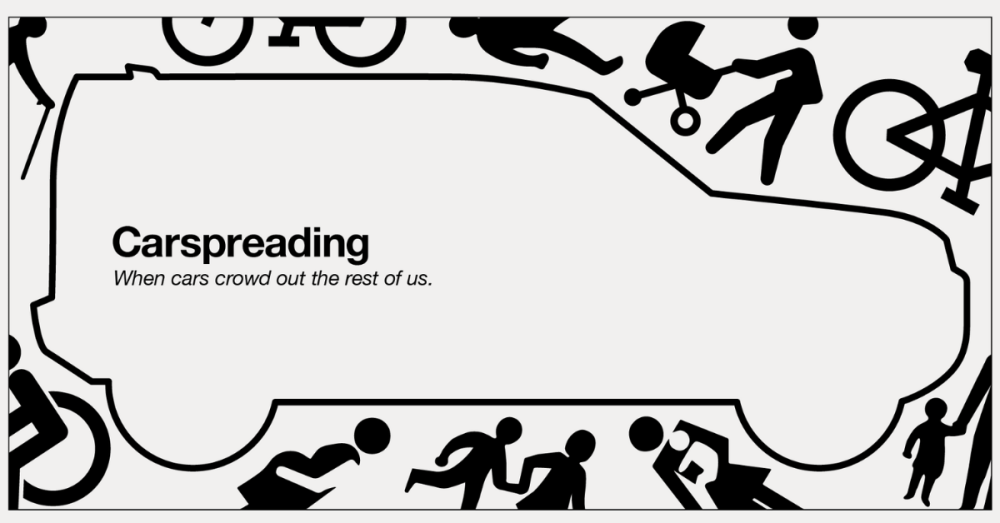Giant cars are a problem for people, communities and climate. We think local authorities need to tackle the problem of car spreading, and we can all help make this happen.
Have you ever spotted a car that’s so massive it hangs off the end of a driveway, forcing you to step out into the road?
What about the mammoth cars that block drop curbs and lurk on the pavement, blocking access for wheelchairs and pushchairs? Maybe you’ve found yourself trapped in your car because the leviathan parked in the next spot is too big for you to open your door?
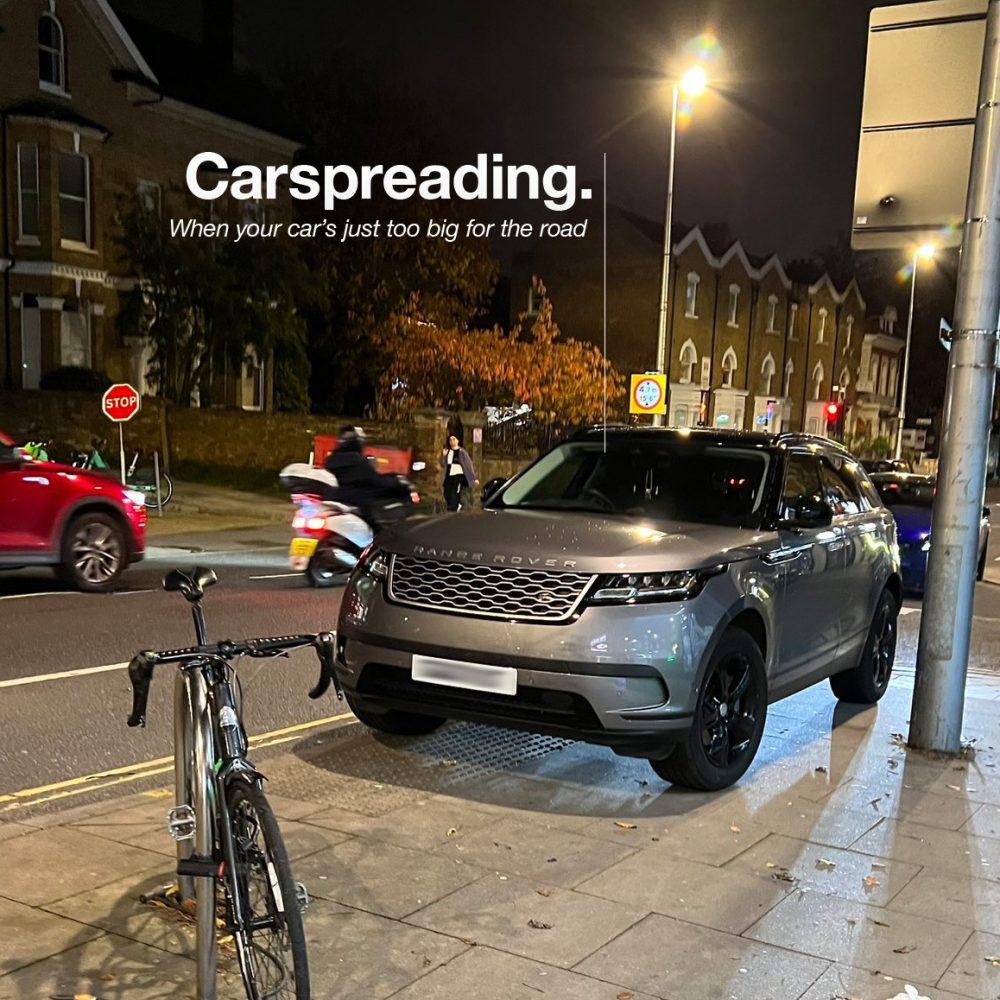
Big cars have taken over. Ten years ago only 20% of new cars sold in the UK were SUVs; now it’s 60%. On
average, SUVs are longer (+26cm), wider (+10cm) as well as heavier (+205kg) and more powerful (+26 horsepower) than a regular car (source: WWF France).
Some people do need a bigger vehicle. Sometimes it’s for mobility or accessibility reasons, sometimes it’s for work, and occasionally it’s for people encountering genuinely more challenging and rugged driving environments.
But most of us don’t need a large vehicle, especially when we live in the city, and big cars bring big problems. Here are five reasons supersize cars are worrying us…
1. They’re putting people’s lives at risk.
A pedestrian or a cyclist hit by a car with a bonnet just 10cm higher than average has a 30% higher chance of being killed.
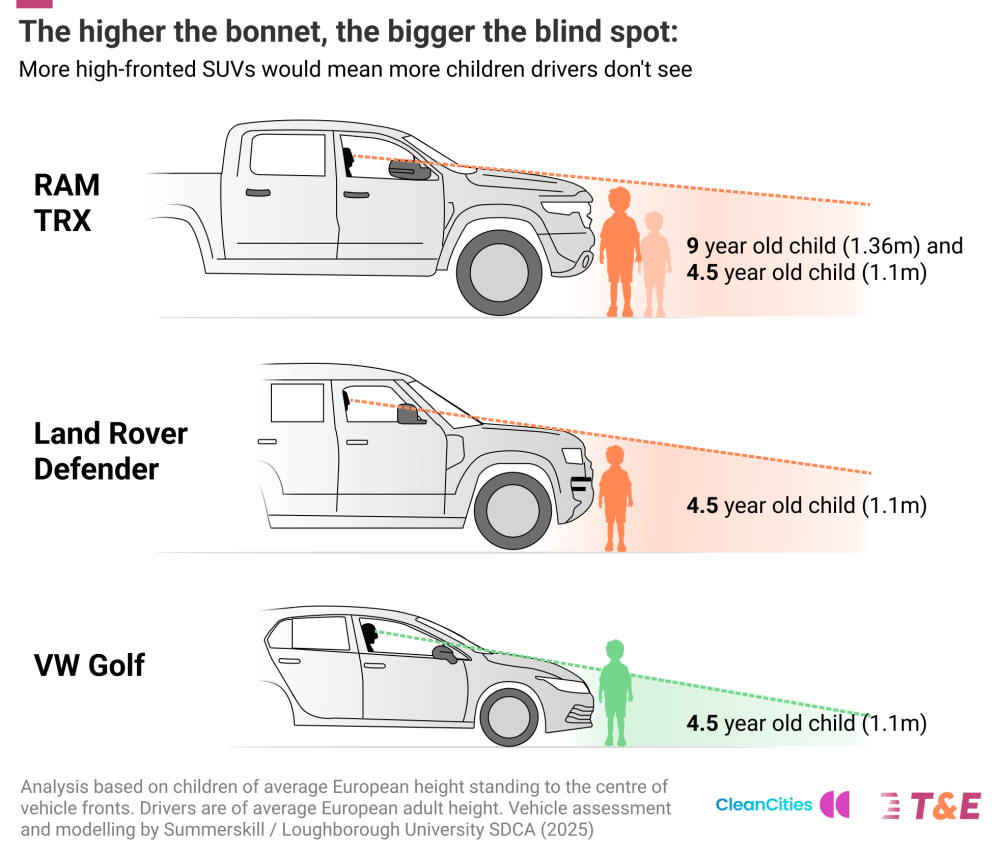
2. They’re taking up more than their fair share of public space.
Large cars block pavements and cycle lanes, cause more traffic congestion, and over-flow their parking spaces. Among the top 100 SUV models in 2023, 52% of vehicles sold were too wide for the minimum specified on-street parking space (180 cm)
3. They’re worsening air pollution.
Bigger heavier cars burn more fuel and emit more pollutants. 96% of neighbourhoods in England and Wales are above WHO guidelines for particulate pollution((PM2.5) and 53% are above guidelines for the toxic gas nitrogen dioxide (NO2).
Children are particularly vulnerable to air pollution because they breathe more rapidly and are closer to the ground, where pollutants are more concentrated. Air pollution causes serious respiratory problems of course but it’s also closely linked to cancer and dementia.
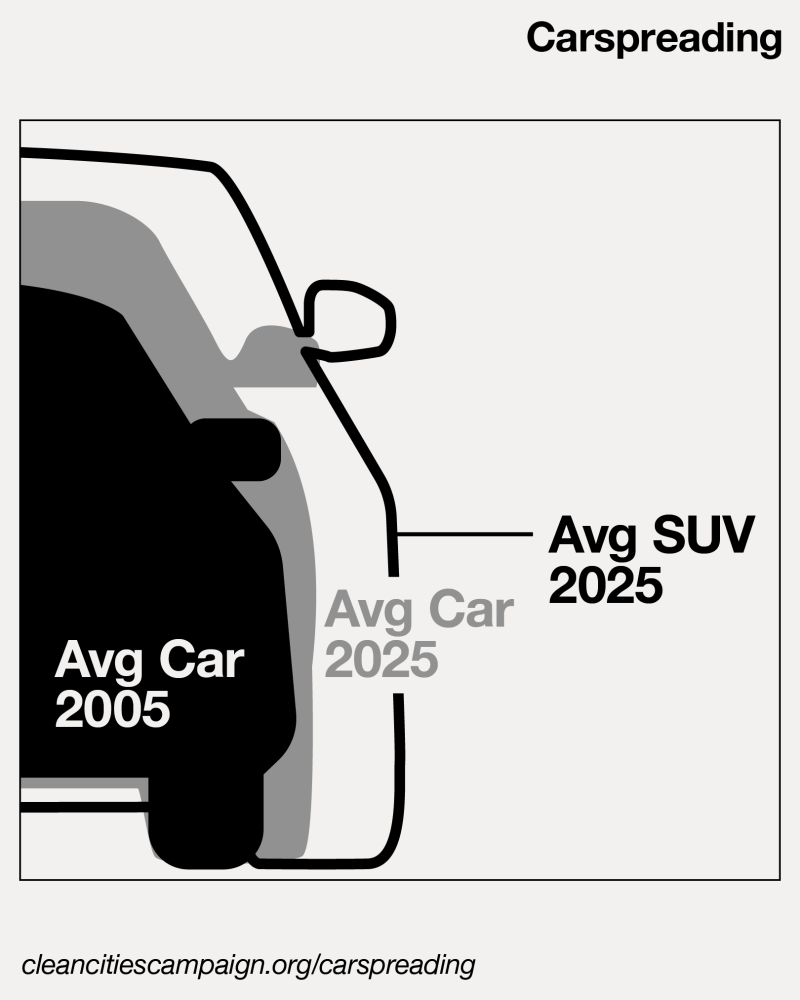
4. They’re fueling the climate crisis.
SUVs and 4x4s burn around 20% more fuel and have roughly 20% higher emissions than medium sized cars, and brand new SUVs have been shown to emit more climate pollution than petrol cars sold over a decade ago.
How bad is their climate impact? If SUVs were a country, they would rank as the sixth most polluting in the world. Or to put it another way, the IEA announced that in the decade between 2010 and 20202 “SUVs were the second-largest contributor to the increase in global CO2 emissions” after the power sector, but ahead of heavy industry, trucks and aviation. Climate pollution from cars could have fallen 30% more between 2010 and 2022 if cars hadn’t balooned in size.
5. They’re simply not fair
Households in the top 20% income bracket are 81% more likely to own a giant car then homes in the other 80%. And what’s more, drivers in the top 20% income group drive three times as many miles a year as those in the bottom 20%. These are, in general, cars owned by the more affluent. Taking up so much space in our cities, and making the air filthy is anti-social and entitled.
What's the solution?
We don’t have to let unnecessary luxury cars dominate our cities and wreck our planet; there are solutions. There is nothing to stop any government setting a maximum size for new cars (expect perhaps the persistent lobbying from the car industry), and vehicle tax could be tweaked to make it fairer, and more reflective of a car’s impact. Banning the advertising of dangerously large cars would be another welcome step.
At a city level, our councils could take a look at Paris. In 2024 the people of Paris voted to triple parking charges for larger cars. We would very much like to see our council – Cardiff – introduce fairer parking charges based on the size of the car to reduce congestion and road danger. If you livei n Cardiff and feel the same, sign the petition here before 18th September 2025.
Is this a 'war on cars?'
When we shared the petition on our social media last week, it got a lot of attention, and a lot of people disagreed very strongly with the idea. What do most people actually think about SUVs?
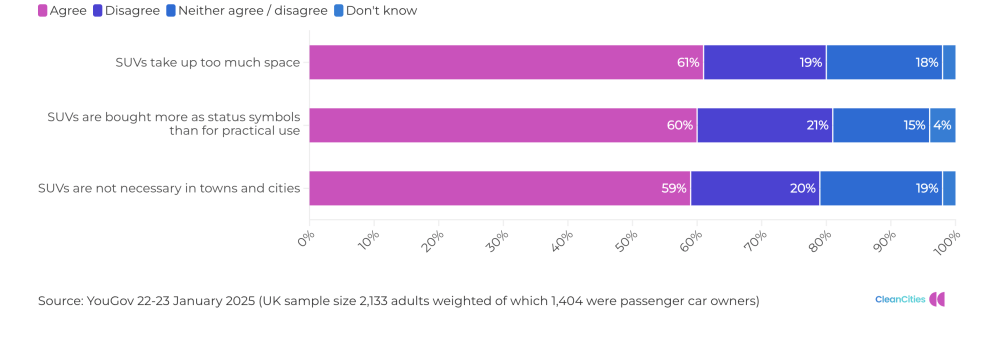
Interestingly, a majority of people are feeling frustrated with SUVs. How about you?
Car use is so embedded in our culture, and so unavoidable for many of us, that is can feel really hard to speak up and say it’s getting a bit much. That’s why we’re really keen to raise awareness of this topic and let everyone feeling uncomfortable with the rise of massive cars, and car dominance in general, know that lots of other people are feeling that way too.
If you feel ready to speak up then there are a few things you can do…
If you live in Cardiff, sign the Car Spreading petition before September 18th 2025. If you’re reading this after that date, it’s still worth reaching out to your local councillor (find them here) to let them know this is something that worries you.
Not in Cardiff? Write to your local council instead.
Use the template from Clean Cities to let your council know that the current situation is unfair, and limiting giant cars needs to be a priority.
Spotted an example of car spreading? Share it with Clean Cities to support their campaigning. You can use their nifty Canva template to drop your images into a ready-to-share format, post pictures on socials with the hashtag #carspreading, or email them to carspreading@cleancitiescampaign.org
Plus don’t forget to give Clean Cities a follow – they’re the ones leading this campaign, and we’re really grateful to them for letting us use their research, stats, and graphics for this blog. They’re a network of organisations on a mission to build public support for cities to shift from polluting vehicles to active, shared and electric mobility – if that sounds good then you can check out their work here.

Looking for more opportunities to build a fairer future? We offer a range of virtual and in-person workshops, talks and coaching sessions for teams and groups. If you’re looking for more support to speak up about the topics you care about, you might find the following sessions useful…
Climate Action for Busy Lives: Learn to power up small actions to create ripples of positive change.
Climate Conversations: Tools for powerful and positive conversations.
Greener At Work: Actionable steps to empower your team and make climate your business.

